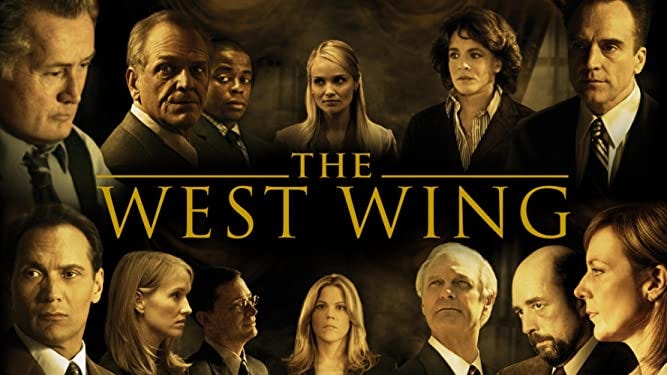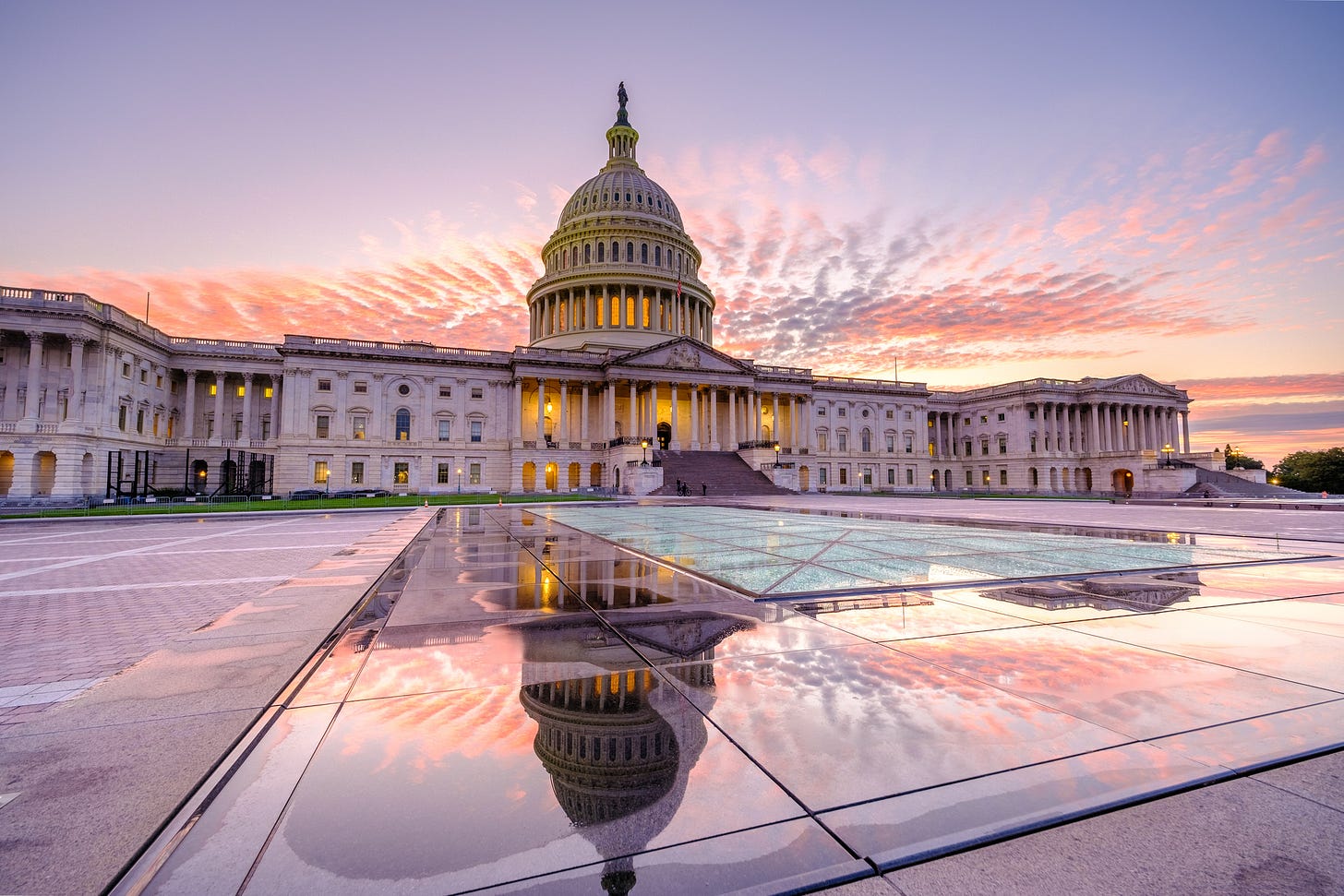The Lion, The Witch, and The War Room
The Seduction of Believing in the Man With A Plan.
The Seduction of Believing in the Man With A Plan
When home sick as a child, it was not uncommon for me to watch the President of the United States get shot. My parents had little interest in children’s TV shows. So when I was home with the sniffles, I watched what they watched, which was often The West Wing. It was either that or Project Runway.
The West Wing, which ran from 1999-2006, provided an idealized picture of American liberalism during the purposefully polarized Bush era. I wouldn’t know any of this; I was a kid. I just liked the fast-talking and the moving cameras. I still do. As I got older, I liked that it painted a picture I wanted to recognize. There wasn’t a perfect White House in The West Wing by any means, but they were trying.
The idea that people were at least working towards doing the right thing, however incremental, misguided, or ill-informed they and their policies might have been, was addictive. They had their shortcomings—that’s what character development was for while they were trying to make life better. Who else was doing that? Or at least, who else was doing that where I could see?
My parents didn’t show me Blue’s Clues as a child, and I have a hard time believing in God. This is one of those fun statements where both parts are true and normally unrelated. The West Wing’s pivotal role in my childhood viewing activity ruined me for deities that I can’t see. I was spoiled by the accessibility of hope. God was not the omniscient, omnipotent, omnibenevolent one; the Bartlett White House was. God was not the one trying to solve the problems that affected me; The West Wing was.
Now, of course, none of this is true. The West Wing is fiction and was not really trying to fix the problems that affected me since my problems were all too real and the characters weren’t. Embedding them in a narrative wasn’t fixing them, but it was validating them. The issues that were tangled with on the show—gun control, gay rights, foreign policy, the death penalty, and student debt—were genuine issues, which is precisely why it worked. To watch people work on these problems in good faith gave the audience a sense of hope, an insider’s look into what must surely be happening in the real White House, in Congress, and in the Governor’s office.
I have been fortunate enough to never hear the phrase “God has a plan” uttered toward me at a funeral. There is a plan laid out in the Torah, ways to behave, deeds to do, deeds to avoid, which advances us through God’s plan of creation, revelation, and redemption. But we so often believe that God has laid out more than that on the individual scale, which is used as a lifeline and a comfort in uncertain times and a way to say to ourselves, “I’m different. God has something in store for me.” This is used to assure ourselves of future success, though in my opinion, it’s also used to draw distinct lines between us, who God must have something great planned for and a child bombed to death in Syria.
God might have a plan for me; I don’t know. If He does, it does not include enough allocated closet space. But they had a plan on The West Wing—not a perfect plan. Not a plan that always worked or that I always agreed with (and sometimes, a secret plan to fight inflation). The key difference between The West Wing and God is that I could see the plan that one of them had for me. Famously, I can’t see the other.
We Didn’t Start the Fire and Other Assorted Political Commentary
American religion is a tricky thing. On the one hand, we live in a secular country, one that is secular by design. On the other hand, we don’t. “In God We Trust” is imprinted on our money, and “under God” was added to the Pledge of Allegiance in 1954. But each successive generation of Americans since the 70s has been less religiously affiliated than the previous. Now, not being religious does not equate to not being spiritual, but the affiliation with a church, with a religious organization, keeps dropping.
There is no national American religion, again, by design. But the role that the American government has filled for many people is that of a religion. We stake our faith and large parts of our identities on political candidates, and we engage in interpersonal Holy Wars, even among those that are technically on the same side as us; we’ve equated voting to prayer, sometimes positively and sometimes negatively.
In an overarching way, the American government occupies the role of a God, or for certain political persuasions, a fallen angel. It is awesome in its power and reach, to the hope of some and the dismay of others. Amid the pandemic, many of us that are terrified of what is happening to our health and our communities are told the civic equivalent of “God has a plan,” which is some form of “trust the government.”
The relative accessibility of the government, at least compared to the intangibility of many religions, makes faith in governmental good works an easier ask. If God held press conferences, perhaps the graph of religious affiliation would look different. I suppose that when the Pope talks, that is a press conference for some peoples’ God, but I don’t know if His Holiness would appreciate being designated the Lord’s Press Secretary.
People lose faith in the government in the same way they lose faith in religious organizations following scandals and corruption. The Pew Research graph I looked at went back to 1972. An incomplete list of things that may have contributed to a declining faith in government: Watergate, the Vietnam War, the entirety of the 1980s, the Iran Hostage Crisis, a seeming merge of political identity, legislative gridlock, mass shootings, school shootings, police shootings, the Iraq War, the Gulf Wars, the Afghanistan War, voting suppression, climate change, abortion rights, marriage rights, corporate control, the pandemic, and anything else that seems like a Billy Joel lyric.
And then came Aaron Sorkin, with his snarky dialogue and good-faith operatives. The West Wing was not above the political mess; it was in the middle of it. But the stories were so specific, the choices fleshed out and argued over, that the political repercussions, many of which reflected real-life American politics, were not mere actions born of a gridlocked, lobbyist-funded cesspool of political crooks. The wars, the bills, and the policy battles were an authentic attempt at steering the country toward redemption.
The West Wing was transparent in an imperfect way; you got to see the messes they made, as well as the cleanup. You got to see people in charge of your life try to help, which humanized the whole ordeal. Even if the grand schemes to make college cheaper and get guns off the street didn’t work on the first pass, or even at all, there was an effort. It made government inaction seem like a curtain that hid the work going on behind the scenes.
“There are two things you never want to let people see how you make ’em: laws and sausages”
After 30 years of declining religious affiliation, American liberals had a new God. Sorkin’s model of smart people in power restored faith in a government they thought was being misused. American politics stopped being a sleazy game of roulette and started being a sophisticated game of chess. You never knew what the players were going to do next, but you better bet they had the next five moves planned out. You just weren’t supposed to see it. (I have no idea if this is how chess works, I have never learned to play and think I am plenty insufferable without doing so.)
But none of this is true. Sometimes people in power are stupid. Sometimes they’re mean. Sometimes they’re, unfortunately just like us, flying by the seat of their pants with little idea of what’s coming next. They’re the beneficiaries of nepotism, institutional racism, and sexism, of failing upwards. But sometimes, they’re also good people, trying to play a complicated game that leaves the individual out of focus.
The West Wing made many of us believe in a God that only existed on television. Although if there is a God, I personally wouldn’t mind him looking like Martin Sheen. But by injecting new hope and faith into America’s civic religion, The West Wing forced a repeat of certain religious doctrines. If the government had a plan, everything would be taken care of. What was meant to happen would happen.
In the same way that C.S. Lewis brought readers through the wardrobe into Narnia, a grand allegory for Christianity, Aaron Sorkin brought viewers through the Oval Office into The Lion, the Witch, and the War Room. The Lion, The Witch, and The Wardrobe is dismissed as a heavy-handed children’s book, and The West Wing is dismissed as a naïve, liberal fantasy.
The fantasy notion isn’t entirely wrong (imagine sexism being genial and innocuous rather than malicious, what a dream), but we can outgrow stories without rejecting them. I hope there is a government that is working for me, even if I can’t see it. I hope there are similarities between the noble lion through the wardrobe, the character behind the facsimile of the Resolute desk, and the leader in our reality. I hope that the notions of sacrifice, virtue, and honor aren’t just morals at the end of a chapter or episode.
There’s nothing wrong with believing in a higher power, whether it be God or the United States House of Representatives. I want to believe that both God and Joshua Lyman are taking care of me, but ultimately, I have to take care of myself. I can’t let faith in a higher order eclipse my responsibility to myself and my community. I have to have a plan, even if someone else does, too.






